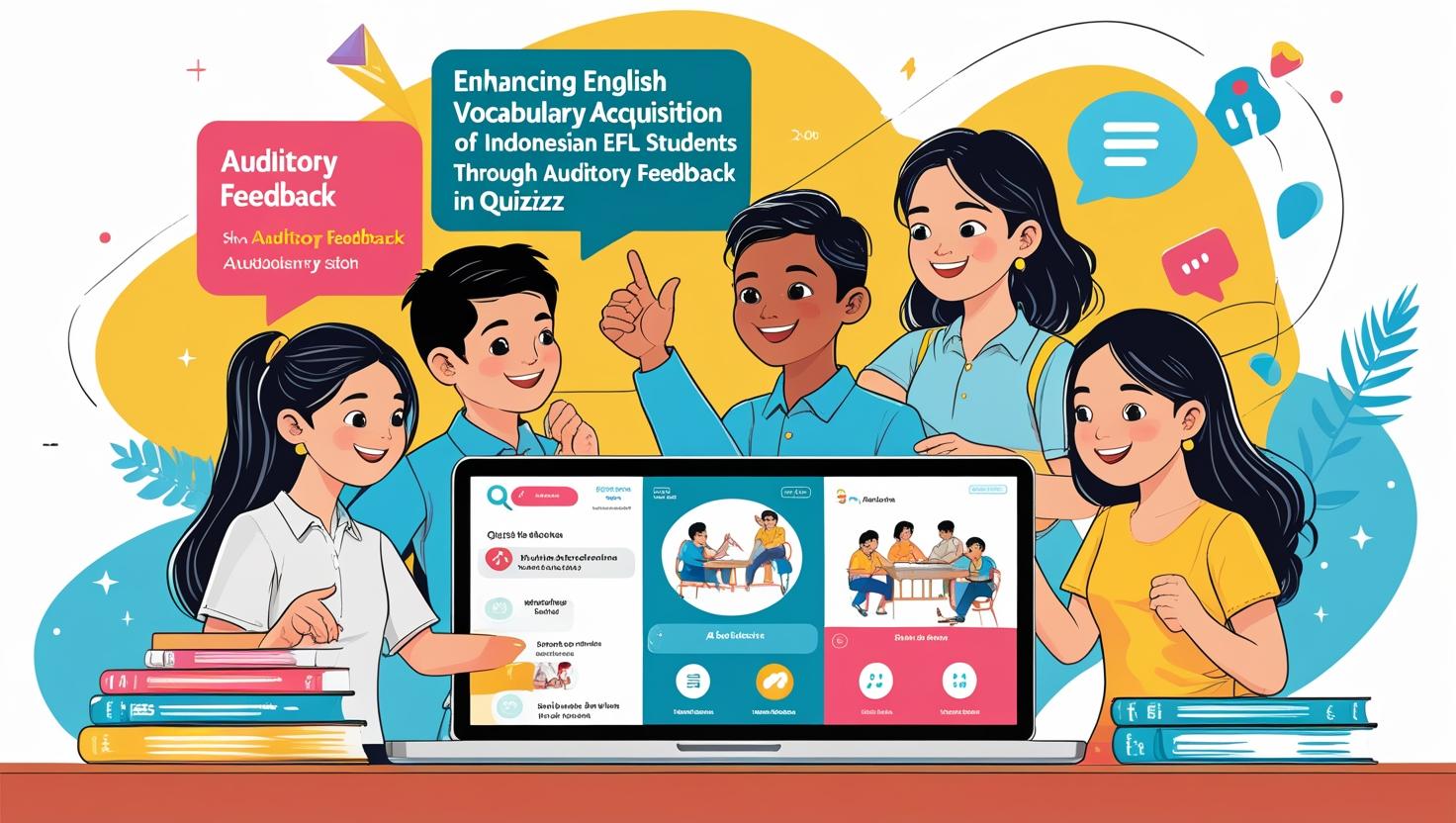Enhancing English Vocabulary Acquisition of Indonesian EFL Students through Auditory Feedback in Quizizz
DOI:
https://doi.org/10.24903/bej.v7i2.2090Keywords:
EFL, vocabulary acqusition, auditory feedback, quizziz, gamified learning, digital instructionAbstract
This quasi-experimental study investigates the efficacy of auditory feedback in Quizizz, a gamified learning platform, for enhancing vocabulary acquisition among Indonesian EFL learners. Sixty-two 11th-grade students from SMA 1 Tenggarong were assigned to an experimental group (n=34) using Quizizz with auditory feedback and a control group (n=28) receiving traditional teacher-led instruction. Over four 60-minute sessions across two weeks, both groups studied identical vocabulary content. Pre- and post-tests employing the Vocabulary Size Test (Nation & Beglar, 2007) measured receptive vocabulary gains, while a bilingual Intrinsic Motivation Inventory (Ryan & Deci, 2000) assessed perceptions. Results revealed significantly greater vocabulary improvement in the experimental group (mean gain +0.20 vs. control's -0.28; *t*(60)=2.34, *p*=.023, *d*=0.42), with notably higher motivation scores across all subscales (Interest, Competence, Effort, Value; *p*<.05). These findings align with Mayer's (2009) Cognitive Theory of Multimedia Learning, demonstrating that auditory-enhanced digital instruction outperforms conventional methods in both cognitive and affective domains. The study advocates for integrating multimodal feedback in EFL pedagogy, particularly in contexts seeking to optimize limited instructional timeReferences
Aminah, S., Nur, D. R., & Ariyanti, A. (2019). An Analysis of Teacher Talk used by English Teacher at SMKN 5 Samarinda. Borneo Educational Journal (Borju), 1(1), 22–28. https://doi.org/10.24903/bej.v1i1.256
Andas, N. H., & Karman, K. (2022). A Need Analysis of Learning Listening based on the Online Quizizz Application at English Language Education Department of Universitas Sembilanbelas November Kolaka. EduLine: Journal of Education and Learning Innovation, 2(3), 339–349. https://doi.org/10.35877/454ri.eduline1221
Arbain, A., & Nur, D. R. (2017). Techniques for teaching speaking skill in Widya Gama Mahakam University. Script Journal: Journal of Linguistics and English Teaching, 2(1), 13–25. https://doi.org/10.24903/sj.v2i1.80
Arbain, A., & Rohman, A. (2023). Dubbing as a Pedagogical Tool: An Experimental Study on Eleventh-Grade Students at SMAN 8 Samarinda. EDUCASIA: Jurnal Pendidikan, Pengajaran, Dan Pembelajaran, 8(2), 147–156. https://doi.org/10.21462/educasia.v8i2.155
Arbain, A., Taufik, A., & Nur, D. R. (2017). Daily English Phrases Book. UWGM Press.
Chen, C. M., Liu, H., & Huang, H. Bin. (2019). Effects of a mobile game-based English vocabulary learning app on learners’ perceptions and learning performance: A case study of Taiwanese EFL learners. ReCALL, 31(2), 170–188. https://doi.org/10.1017/S0958344018000228
Efendi, M., Sujarwati, I., & Harahap, A. (2025). The Effectiveness of Quizizz Application in Enhancing Students’ Vocabulary Mastery based on Their Learning Styles. JEELS (Journal of English Education and Linguistics Studies), 12(1), 277–299. https://doi.org/10.30762/jeels.v12i1.4919
Erliana, U., & Arbain, A. (2020). The Effectiveness of Using Video Clip in Teaching English Vocabulary at SD Fastabiqul Khairat Samarinda. IJOTL-TL: Indonesian Journal of Language Teaching and Linguistics, 5(2), 123–134. https://doi.org/10.30957/ijoltl.v5i2.623
Fadlilah, A., & Ma’rifah, U. (2022). ENHANCING STUDENTS’ LISTENING SKILL THROUGH QUIZIZZ AUDIO FEATURE IN ONLINE LEARNING AT JIARAWANON-UTIS 4 SCHOOL. ETERNAL (English Teaching Journal), 13(1), 91–102. https://doi.org/10.26877/eternal.v13i1.10883
Gracella, J., & Rahman Nur, D. (2020). Students’ Perception of English Learning through YouTube Application. Borneo Educational Journal (Borju), 2(1), 20–35. https://doi.org/10.24903/bej.v2i1.623
Javadi, Y., & Shehni, M. C. (2020). The role of auditory input enhancement through whats app in efl learners’ vocabulary learning and retention. Theory and Practice in Language Studies, 10(12), 1576–1586. https://doi.org/10.17507/tpls.1012.10
Krashen, S. D. (1982). Principles and Practice in Second Language Acquisition. Pergamon Press.
Lim, M. S., & Toh, W. T. (2024). Digital classroom ecology and learner readiness in gamified EFL contexts. International Journal of Emerging Technologies in Learning, 19(1), 23–34.
Mayer, R. E. (2009). Multimedia Learning (2nd ed.). Cambridge University Press.
Mustafah, M., Riyanto, Y., & Lestari, D. (2023). The effects of feedback types on vocabulary learning using game-based tools. Journal of English Language Pedagogy and Practice, 12(2), 85–94.
Nugraheni, R., & Fakhurriana, R. (2023). Boosting English Vocabulary Proficiency in EFL Learners: A Study on the Efficacy of Quizizz at IAIN Kediri. Indonesian Journal of Multidisciplinary Educational Research, 1(2), 161–177. https://doi.org/10.30762/ijomer.v1i2.1379
Nur, D. R. (2020). Virtual Reality adoption in Indonesia higher Education from lecturer’s voice. English Teaching Journal: A Journal of English Literature, Language and Education, 8(1), 31–35. https://doi.org/10.25273/etj.v8i1.6672
Nur, D. R., & Jamilah, J. (2022). English Language Imperative Level in Indonesia. Intensive Journal, 5(1), 36–43. http://dx.doi.org/10.31602/intensive.v5i1.5986
Pratama, F., & Rachman, D. (2024). The Impact of Quizizz Language Learning App in Improving Students’ Listening Skills. JIMPS, 9(3). https://doi.org/10.31402/jimps.v9i3.31402
Ryan, R. M., & Deci, E. L. (1985). Self-Determination Theory and the Facilitation of Intrinsic Motivation, Social Development, and Well-Being Self-Determination Theory. Ryan.
Sanosi, A. B. (2018). The effect of Quizlet on vocabulary acquisition. Asian Journal of Education and E-Learning, 6(4), 71–77. https://doi.org/10.24203/ajeel.v6i4.5396
Teng, M. F. (2023). The effectiveness of multimedia input on vocabulary learning and retention. Innovation in Language Learning and Teaching, 17(3), 738–754. https://doi.org/10.1080/17501229.2022.2131791
Wang, Y., Chen, X., & Jin, Y. (2021). Apps for English language learning: A systematic review. Computer Assisted Language Learning, 34(5–6), 494–528. https://doi.org/10.1080/09588221.2019.1640746
Xu, Q., & Peng, W. (2017). Mobile-assisted oral feedback and student performance in EFL learning. Language Learning & Technology, 21(3), 86–102. https://doi.org/10.1016/j.chb.2016.12.045

Downloads
Published
How to Cite
Issue
Section
License
Copyright (c) 2025 Avila Akhtar Tamam, A.K. Amarullah

This work is licensed under a Creative Commons Attribution 4.0 International License.
Authors retain copyright and grant the journal right of first publication with the work simultaneously licensed under a Creative Commons Attribution 4.0 International License that allows others to share the work with an acknowledgment of the work's authorship and initial publication in this journal.



